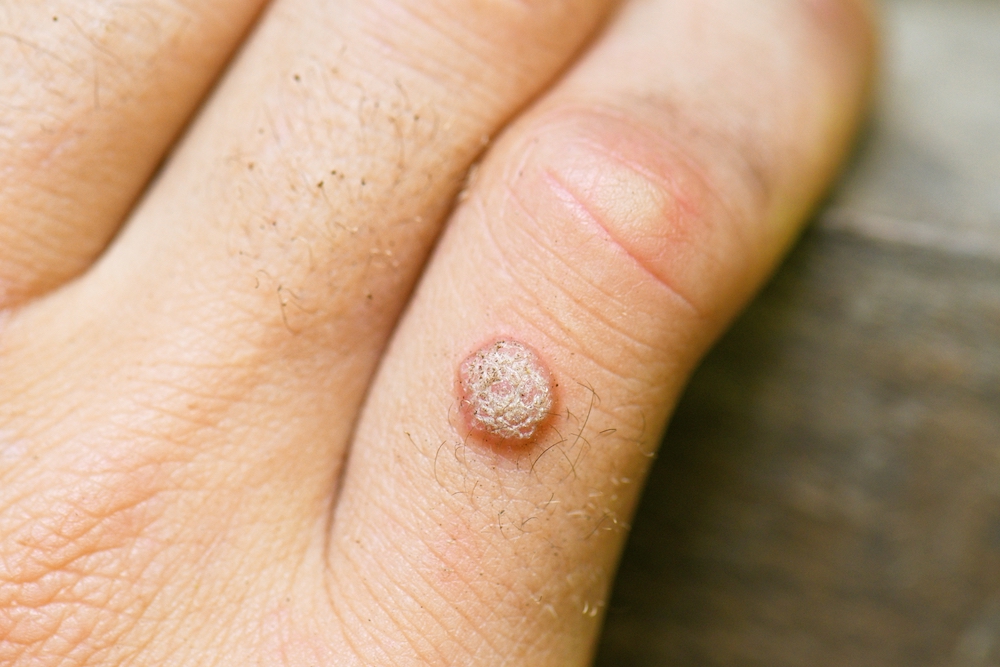Warts 101: What You Need to Know

You’ve probably heard in a childhood fairy tale that touching a toad or frog will give you warts. While this is not entirely accurate, there is some truth to the lore. Warts are spread by a virus that passes from person to person through touch. Warts are very common, but many people have them removed by a dermatologist because they can be irritating or downright embarrassing.
If you have a wart, especially on your hands, you may want to seek the help of a dermatologist. Your dermatologist can evaluate the wart to identify it’s type and provide you with options for removal. In most cases, warts are nothing to be concerned about and their removal is relatively simple and painless.
The common wart will appear on your hands or fingers. They are small and often rough in texture. They are harmless and non-cancerous, but can still be removed by your doctor if they become bothersome. Although they may be harmless, warts do spread by touch. That means that you could spread warts to other people through direct contact or even indirect contact.
In this article, we will talk about how warts develop and the most common kinds of warts that dermatologists see. While there are at home remedies to remove warts, you should consult with your Atlanta-area dermatologist if you believe you have a wart on your hands or feet.
What is a wart?
Warts are small bumps that typically appear on your fingers, hands or feet. They generally have a rough texture and can vary in color from flesh toned, to white or even pink. Often, there are black dots within the wart which are clots formed at the blood vessels.
Words are caused by the HPV virus. The virus can pass through contact with the skin, either directly or indirectly. For example, you may contract the virus through shaking hands with a person who has the virus. Or, you could contract the virus by sharing gym equipment or touching public hand rails where the virus is present. You likely come in contact with this virus quite regularly, but that does not mean that we have warts all the time. Only certain strands of the HPV virus will cause warts to form and everybody responds to the virus differently.
You are more likely to develop a response to the HPV virus if you are a young person or someone with a suppressed immune system due to another condition.
How can you prevent warts?
Preventing contact with the HPV virus can be difficult. However, there are some things you can do to reduce your risk of contracting or spreading the virus. The first thing you should do is avoid contact with people who have a visible wart on their hand or foot. As much as possible, avoid using shared gym equipment or other places that are touched by many people. If you do have a wart, avoid picking or touching it. Make sure that you use sanitized grooming equipment such as fingernail clippers and emery boards.
What are the most common types of warts?
Plantar warts
Plantar warts appear on the bottom of your feet. Due to their location, they can be painful or uncomfortable. Plantar warts often require treatment which can include removing the top layers of the skin and then freezing the wart. This treatment may require several visits to the dermatologist.
Common warts
Common warts generally appear on your hands, fingernails or elbows. These are generally not painful or uncomfortable, but can be unsightly. Many people will choose to have these removed, although it is not necessary. Some common warts can be shaved by your dermatologist or receive a treatment similar to plantar warts which involves freezing.
Flat warts
Flat warts typically appear on the legs as round patches of scaly skin. As the name implies, they are flat. Because of this, women can still shave their legs spreading the virus rapidly. Flat warts can be difficult to treat because they spread, sometimes resulting in tens, or even hundreds, of warts on the feet and legs. A dermatologist may recommend medication to treat flat warts, although results may take a significant amount of time.
Warts may not be pleasant to talk about, but they are a fact of life for many people. Understanding the cause and treatment options can help you make the best choice when dealing with warts. If you have warts or other concerning skin conditions, contact the Atlanta and College Park area dermatologist at Buckhead Dermatology. By calling our office, you can schedule an appointment with our board-certified dermatologist and receive expert and caring treatment right away.
